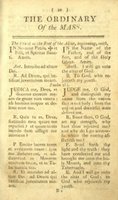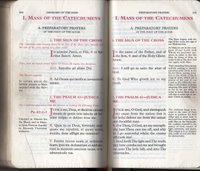Was reading the old
Catholic Encyclopaedia article on women last night, and it makes me look like a raving feminist. Which is quite funny, but made me wonder about a few things.
Firstly, I need to get to know more women. I don't
understand women. I don't know what it
means to be a woman. Okay, so we get a pretty good example in Our Blessed Mother, but still. I think hitherto my entire understanding of myself as a girl is that I'm different to all the guys I know. Which is completely true but could do with a lot of work.
One thing I reckon is that the way we love is different to the way men love. I'm not entirely sure, but it seems less definable. I think there is less distinction in women's love - friendship, the love of sister, mother, daughter, wife. It's sort of all mixed up and indeterminate. Even with Him, there's an element of wanting to make it all okay, to take Him in my arms and make things better. Which is complete nonsense, although if He will insist on coming to us so helplessly, perhaps not a surprising sentiment. At the same time, the exact opposite is true. On the other hand,
she did just that, so maybe I'm not totally mad.
Then there's the man-woman thing. That I don't quite get. Because a lot of it seems to be based on the concept that because we're emotional we can't make rational decisions. That's not true. We get emotional, acknowledge our emotions, and then ignore them in making decisions. Or at least, we should and hopefully do. At the same time, does anyone else wish that someone would just take them in hand and tell them?
Point being, I have a lot to learn, and I'm not going to learn it surrounded by men. Which means finding women to hang around with. Back in the day, it was straight from your father's house to one of two places: marriage or the convent. It's unnatural to be a single woman like this. Maybe everyone else finds it okay, but I don't. It's... weird.
Sorry... this should probably have gone on me own blog, but wanted to discuss.


 Those of you reading German check this out: http://www.alte-messe.de
Those of you reading German check this out: http://www.alte-messe.de

